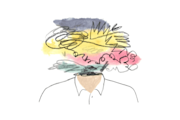As with a number of other mental health conditions, the terms “dementia” and “Alzheimer’s” have a history of being misused.
Though there is overlap between the two, dementia and Alzheimer’s are not the same thing and using them interchangeably can be dangerous: If one doesn’t use precise language with a medical professional or caregiver, the consequences can be quite serious for the patient.
What’s the difference between dementia and Alzheimer’s?
To put it simply, Alzheimer’s is a form of dementia. The word “dementia” refers to a group of symptoms—memory loss, difficulties with language, and more—while “Alzheimer's” refers to a disease that is one possible cause of these symptoms. Indeed, Alzheimer’s is the most common form of dementia.
To further tease out the differences and similarities between these conditions, we need to clearly and precisely define each term.
What is dementia, exactly?
Dementia is a syndrome, not a disease. This means that dementia is a set of symptoms that does not necessarily have one precise cause; it can have multiple causes or no defined cause.
The symptoms described by dementia are both cognitive and psychological.
According to the Mayo Clinic, symptoms of dementia can be separated into two categories: cognitive and psychological.
Cognitive symptoms include:
Short-term memory loss: asking the same question over and over again, forgetting recurring events
Impaired language: trouble “finding” a word, struggling to communicate a simple statement
Disorientation: getting lost in a familiar place
Psychological dementia symptoms can include:
Depression: taking less pleasure in activities that used to bring joy
Paranoia: thinking people/events are conspiring against them
Anxiety: withdrawing from social situations or public out of heightened worry
Dementia symptoms present in a variety of diseases, (the most common of which, as we’ve said, is Alzheimer’s disease). Other forms of dementia include Lewy body dementia, vascular dementia, and Parkinson’s disease; and there’s also something known as “mixed dementia,” which is when dementia symptoms are caused by more than one disease.
Worldwide, an estimated 50 million people have dementia, with ten million new cases each year. Though it is most common among the elderly, it is not a normal part of aging, and there are cases of dementia in younger people. Dementia affects women at twice the rate it affects men.

What causes dementia?
To put it as generally as possible, dementia is caused by damage to brain cells that impairs their ability to carry out their normal functions. Depending on where the damage takes place, dementia symptoms present in speech, memory, motor skills, and so on, or a combination of all these factors.
So what causes that damage? Again, the most common cause of dementia is Alzheimer’s disease, which impairs brain cells’ ability to communicate with each other due to an increase in certain proteins in and around those cells.
Other causes include damage to the vessels that bring blood to the brain due to an injury or stroke (as seen in vascular dementia) or the degeneration of nerves in certain parts of the brain (as seen in frontotemporal dementia).
But the damaged brain cells that lead to dementia symptoms can also be caused by protracted alcohol or drug abuse, chronic sleep apnea, degeneration associated with aging, and simple genetics. These conditions cause the various diseases that cause dementia.
Signs of dementia
The earliest signs of dementia can be quite subtle; we often think of short-term memory loss as a standard and unavoidable part of aging, so we think little of it when an older person misplaces their glasses with increased frequency. However, memory loss that interferes with daily life is not a “normal” part of aging.
Beyond memory loss, early warning signs of dementia include:
Difficulty planning: suddenly not knowing how long it takes to drive to the coffee shop you’ve been going to for years
Disorientation: being confused as to where you are or even what month or year it is
Issues with language: struggling to find simple words like “pen,” or trouble spelling familiar words
Personality changes: uncharacteristic depression or social withdrawal; getting upset more easily than usual
Trouble with spatial understanding: spilling when pouring a glass of water, bumping into furniture that hasn’t moved
Struggling to complete familiar tasks: forgetting a recipe you’ve been making all your life
These are just six of many possible signs of dementia, and again, they can be subtle. Dementia can go unnoticed if the symptoms seem like they’re not a big deal.
Is there a cure for dementia?
Because it is not a disease, but rather a syndrome, there can’t be one “cure” for dementia, there can only be cures for the diseases that cause it, and most of these diseases are incurable.
That said, research has found that there are ways to decrease the risk of dementia through lifestyle interventions such as improving diet, increasing physical activity, and avoiding alcohol and tobacco.

What is Alzheimer’s, exactly?
At the risk of being repetitive: Alzheimer’s is a disease (not a syndrome), one that presents with dementia symptoms, and it is the most common form of dementia. Alzheimer’s is an irreversible, progressive disease, meaning it worsens as time goes on: What starts with misplacing one’s keys can become an inability to understand one’s context entirely.
Alzheimer’s disease tends to affect people over the age of 65, though it has been found in younger people, as well. Some analyses project that nearly 14 million Americans could have the disease by the year 2060. The symptoms of Alzheimer’s disease are dementia symptoms—the cognitive and psychological symptoms listed above.
What causes Alzheimer’s disease?
Alzheimer’s disease takes place when proteins amass in the brain, interfering with brain cells’ ability to function normally. Unfortunately, researchers have not yet determined the cause of this protein build up.
That said, Alzheimer’s disease has been known to run in families. While there is no “Alzheimer’s gene,” scientists have identified three genes that are often associated with the disease.
What are the 7 stages of Alzheimer’s disease?
Though every case of Alzheimer’s is unique, doctors have mapped out its general progression into seven stages, basically points on a gradient of brain function.
Stage 1: No symptoms
Alzheimer’s disease can actually be present in a brain before any dementia symptoms are clear. A person experiencing the first stage of Alzheimer’s will appear outwardly as though nothing is abnormal, though extremely exact scrutiny of the brain may show the beginnings of the disorder.
Stage 2: Very mild decline
This is the stage during which a person may misplace items or having issues recalling things. The change is so subtle, it’s easy to be confused with more standard memory loss related to aging.
Stage 3: Mild decline
At this point, dementia symptoms like memory loss become noticeable to others. One’s family members might pick up on their loved one suddenly being unable to find the words they want to use or forgetting names.
Stage 4: Moderate decline
People experiencing stage four of Alzheimer’s disease will clearly display dementia symptoms. They may forget to do things like take medication or pay bills, may have more profound memory loss relating to their personal histories, or may be unable to name household objects.
Stage 5: Advanced decline
The fifth stage of Alzheimer’s disease is when the sufferers begin to depend on others. They may not be able to remember where they live and so should not be out alone, and they may begin to need help with basic motor skills like getting dressed.
While childhood memories are often still intact, people experiencing stage five will have significant trouble remembering their more recent contexts.
Stage 6: Severe decline
People in stage six of Alzheimer’s disease can’t live independently. They need professional supervision as they will be unable to bathe themselves or use the restroom. They may be in a state of confusion or fear about their surroundings more often than not, and may not recognize the faces of even close loved ones.
It’s no surprise that this is when psychological symptoms are very obvious, as well: sufferers are likely to have substantial personality shifts towards depression, anti-socialness, paranoia, and anxiety.
Stage 7: Very severe decline
This is the terminal stage of Alzheimer’s disease. At this point, the brain can no longer communicate to the body what to do, and so even very basic motor skills like chewing and swallowing have eroded.
Communication with a person in the seventh stage of Alzheimer’s disease is essentially impossible, as both language and understanding of environment have been too badly damaged by the disease.
What can I do if I think my loved one has Alzheimer’s or dementia?
Because the symptoms of Alzheimer’s disease are dementia symptoms, the early warning signs listed above (short-term memory loss, disorientation) are the same. But let’s say you see these warning signs in a family member: What should you do?

Broaching the topic can be extremely difficult, especially if you’re dealing with a parent. The idea of having dementia is extremely scary for anyone, and even if you mean well, your loved one may shut the topic down immediately if you don’t approach it with sensitivity.
Be sure to choose a time when you’re more or less getting along, neither of you are hungry or tired, and when there’s nothing more immediate on either of your minds.
Then, it may be best to center yourself rather than your loved one. “I’ve noticed some new behaviors in you; have you noticed them, as well?” or even simply “Would you want me to tell you if I had concerns about your health or behavior?”
The next step after this tough conversation is making an appointment with your loved one’s doctor—their general practitioner—as soon as you can. You should start with a physician who will be able to discern whether the issue is dementia or perhaps something that can be explained by a physical trauma.
If it’s at all possible for you to go with them, do: This will help both in terms of giving you necessary care and treatment information, and help your loved one feel supported.
If their physician thinks it’s necessary, they can run diagnostic tests like brain imaging, and neurological tests of their reflexes and memory. It’s important not to “diagnose” dementia yourself, without a doctor’s agreement.
Offer assistance with the tasks that may have become difficult like shopping or paying bills. Be sure to encourage your loved one to take part in activities they’ve usually found stimulating. Keeping the brain active and the mood up are thought to make a difference in the progression of dementia diseases like Alzheimer’s.
And don’t forget to look after yourself.
Dementia takes its toll on the sufferer as well as their loved ones. It’s scary to watch someone’s personality fade away or change. You won’t be able to help your loved one at all if you are suffering yourself. Finding support—be it a therapist, a support group, or something else entirely—is vital in helping you cope with your new reality.
Alzheimer’s and dementia: What’s the difference? (2020). Retrieved November 20, 2020, from Mayo Clinic website: https://www.mayoclinic.org/diseases-conditions/alzheimers-disease/expert-answers/alzheimers-and-dementia-whats-the-difference/faq-20396861
Andrade, A. G., Bubu, O. M., Varga, A. W., & Osorio, R. S. (2018). The Relationship between Obstructive Sleep Apnea and Alzheimer’s Disease. Journal of Alzheimer’s Disease, 64(s1), S255–S270. https://doi.org/10.3233/jad-179936
Bekris, L. M., Yu, C.-E., Bird, T. D., & Tsuang, D. W. (2010). Review Article: Genetics of Alzheimer Disease. Journal of Geriatric Psychiatry and Neurology, 23(4), 213–227. https://doi.org/10.1177/0891988710383571
Causes - Alzheimer’s disease. (2020). National Health Service. Retrieved November 23, 2020, from https://www.nhs.uk/conditions/alzheimers-disease/causes/
Dementia: Causes, Symptoms, Treatment, Diagnosis, Prevention. (2019). Retrieved November 20, 2020, from Cleveland Clinic website: https://my.clevelandclinic.org/health/diseases/9170-dementia
Dementia - Symptoms and causes. (2019). Retrieved November 20, 2020, from Mayo Clinic website: https://www.mayoclinic.org/diseases-conditions/dementia/symptoms-causes/syc-20352013
Geschwind, M. D., Haman, A., & Miller, B. L. (2007). Rapidly Progressive Dementia. Neurologic Clinics, 25(3), 783–807. https://doi.org/10.1016/j.ncl.2007.04.001
How to reduce your risk of dementia. (2020). Retrieved November 23, 2020, from Alzheimer’s Society website: https://www.alzheimers.org.uk/about-dementia/risk-factors-and-prevention/how-reduce-your-risk-dementia
Korsakoff syndrome. (2015). Retrieved November 22, 2020, from Alzheimer’s Disease and Dementia website: https://www.alz.org/alzheimers-dementia/what-is-dementia/types-of-dementia/korsakoff-syndrome
Livingston, G., Sommerlad, A., Orgeta, V., Costafreda, S. G., Huntley, J., Ames, D., … Mukadam, N. (2017). Dementia prevention, intervention, and care. The Lancet, 390(10113), 2673–2734. https://doi.org/10.1016/s0140-6736(17)31363-6
Matthews, K. A., Xu, W., Gaglioti, A. H., Holt, J. B., Croft, J. B., Mack, D., & McGuire, L. C. (2018). Racial and ethnic estimates of Alzheimer’s disease and related dementias in the United States (2015-2060) in adults aged ≥65 years. Alzheimer’s & Dementia, 15(1), 17–24. https://doi.org/10.1016/j.jalz.2018.06.3063
Medical Tests. (2020). Retrieved November 23, 2020, from Alzheimer’s Disease and Dementia website: https://www.alz.org/alzheimers-dementia/diagnosis/medical_tests
Mixed Dementia. (2015). Retrieved November 20, 2020, from Alzheimer’s Disease and Dementia website: https://www.alz.org/alzheimers-dementia/what-is-dementia/types-of-dementia/mixed-dementia
Nania, R. (2020, June 25). Will We Ever Cure Dementia? Retrieved November 23, 2020, from AARP website: https://www.aarp.org/health/dementia/info-2020/cure-for-dementia.html
Reisberg , B. (2006). The Global Deterioration Scale for Assessment of Primary Degenerative Dementia. Retrieved from https://www.fhca.org/members/qi/clinadmin/global.pdf
Rossor, M. N., Fox, N. C., Mummery, C. J., Schott, J. M., & Warren, J. D. (2010). The diagnosis of young-onset dementia. The Lancet Neurology, 9(8), 793–806. https://doi.org/10.1016/s1474-4422(10)70159-9
10 Warning Signs of Alzheimer’s. (2020). Retrieved November 22, 2020, from https://www.cdc.gov/aging/healthybrain/ten-warning-signs.html
The role of genes in your Alzheimer’s risk. (2019). Retrieved November 22, 2020, from Mayo Clinic website: https://www.mayoclinic.org/diseases-conditions/alzheimers-disease/in-depth/alzheimers-genes/art-20046552
The Truth About Aging and Dementia. (2020). Retrieved November 22, 2020, from https://www.cdc.gov/aging/publications/features/dementia-not-normal-aging.html
Vascular Dementia. (2018). Retrieved November 22, 2020, from www.stroke.org website: https://www.stroke.org/en/about-stroke/effects-of-stroke/cognitive-and-communication-effects-of-stroke/vascular-dementia
What Happens to the Brain in Alzheimer’s Disease? (2017.) Retrieved November 22, 2020, from National Institute on Aging website: https://www.nia.nih.gov/health/what-happens-brain-alzheimers-disease
What Is Dementia? (2019). Retrieved November 20, 2020, from Alzheimer’s Disease and Dementia website: https://www.alz.org/alzheimers-dementia/what-is-dementia
Why is dementia different for women? (2018). Retrieved November 20, 2020, from Alzheimer’s Society website: https://www.alzheimers.org.uk/blog/why-dementia-different-women#:
World Health Organization: WHO. (2020, September 21). Dementia. Retrieved November 20, 2020, from Who.int website: https://www.who.int/news-room/fact-sheets/detail/dementia#






